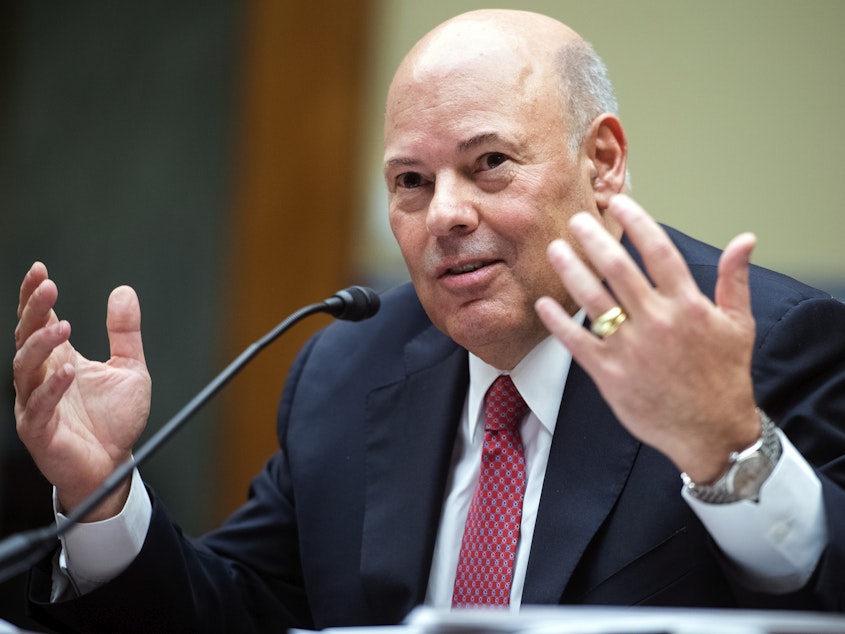House Democrats Investigating Postmaster General Over Campaign Finance Allegations

House Democrats say they are investigating Postmaster General Louis DeJoy over allegations reported by The Washington Post that he asked employees to donate to certain political candidates and then reimbursed them through bonuses.
Updated at 2:06 p.m. ET
"If these allegations are true, Mr. DeJoy could face criminal exposure — not only for his actions in North Carolina, but also for lying to our committee under oath," House Oversight Committee Chairwoman Carolyn Maloney, D-N.Y., said in a written statement.
"We will be investigating this issue, but I believe the Board of Governors must take emergency action to immediately suspend Mr. DeJoy, who they never should have selected in the first place," Maloney added.
DeJoy, a major Republican donor and supporter of President Trump's, was appointed by the U.S. Postal Service's board of governors, not confirmed by Congress. He ran afoul of House Democrats after ordering an "operational pivot" within the Postal Service that caused some delays — prompting additional criticism by Democrats who accused him of trying to hurt voting by mail.
Sponsored
DeJoy has defended himself vigorously to congressional and state officials. The Postal Service has been financially underwater for years and is overdue for reform, he argues. And he rejected out of hand the idea that he is Trump's saboteur in place to hurt voting by mail, which the president criticizes but also uses himself.
State officials who spoke with DeJoy said he'd vowed to them that the Postal Service would handle ballots this year "like gold."
New allegations
In the Post report published Sunday, multiple former employees of DeJoy's former company, New Breed Logistics, said they were asked to give money to Republican candidates between 2003 and 2014. Then, according to the report, DeJoy would ensure that the employees who contributed receive extra bonus money.
If those accounts are accurate, the conduct would be illegal under federal law.
Sponsored
"Louis was a national fundraiser for the Republican Party. He asked employees for money. We gave him the money, and then he reciprocated by giving us big bonuses," David Young, DeJoy's former director of human resources, told the Post.
NPR has not independently confirmed the Post's reporting. It appears to describe what is known as a straw donor scheme, in which a person donates in another's name to get around individual contribution limits. It's not illegal for corporations to encourage employees to donate to political candidates.
During an Aug. 24 hearing in the House, DeJoy denied paying back several executives for contributing to Trump's campaign.
"That's an outrageous claim, sir, and I resent it," he said when asked by Rep. Jim Cooper, a Democrat from Tennessee. "The answer is no."
"So, all your campaign contributions were legal?" Cooper asked.
Sponsored
"I'm fully aware of legal campaign contributions, and I resent the assertion, sir. What are you accusing me of?" DeJoy responded.
Trump told reporters that if DeJoy did something wrong he should be investigated and lose his job.
White House chief of staff Mark Meadows appeared to downplay the investigation when asked about it on Tuesday morning.
"Never underestimate Congress' ability to ratchet up an investigation 60 days out from a presidential election," he said. "Louis DeJoy is an honorable man ... I'm sure he'll cooperate completely."
Maloney's committee is already investigating DeJoy's tenure at the Postal Service and has subpoenaed his communications about operations.
Sponsored
In a statement Tuesday, committee member Rep. Gerald Connolly, D-Va., said DeJoy's response to a document request for communications with the Trump campaign has been "inadequate."
DeJoy said in a letter earlier this month that he did not consider "the communications I had with certain personal friends of mine regarding the president's statements about the Postal Service to be with the 'Trump campaign.'"
"Although you confirmed that you communicated with individuals associated with the Trump campaign, you failed to identify the individuals you spoke with—or when these conversations occurred," Connolly said in a response to DeJoy. "Claiming a personal relationship does not absolve you of your responsibility to produce these documents to the committee."
The subpoena requires DeJoy to produce documents to the committee by Sept. 16.
NPR congressional correspondent Claudia Grisales contributed to this report. [Copyright 2020 NPR]



